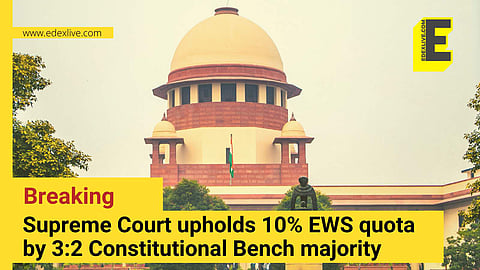

The Supreme Court has upheld the 103rd Amendment to the Constitution that provides 10% reservation for Economically Backward Sections (EWS) in educational institutions and government jobs.
The amendment was upheld by a 3:2 majority on the five-judge constitutional bench of the Supreme Court comprising Chief Justice UU Lalit and Justices Dinesh Maheshwari, Bela Trivedi, JB Pardiwala and Ravindra Bhat. Justice Maheshwari noted that the reservation for the EWS category did not violate the basic structure of the constitution by breaching the 50% limit on reservations. He remarked that the limit was not "inflexible," as per a tweet by LiveLaw.in. The EWS category also excludes individuals belonging to the Scheduled Castes, Scheduled Tribes and Other Backward Classes. The majority view of the verdict also held that this exclusion did not violate the Constitution either.
Justice Trivedi remarked that reservations should have a "time limit". "At the end of 75 years of independence, we need to revisit the system of reservation in the larger interests of the society. Representation of SC/ST in Parliament and legislative assemblies was to expire after the time limit. The reservation for Anglo Indians in Parliament has come to end. Likewise, there should be a time limit," said Justice Trivedi, as per LiveLaw.in. Concurring with the majority view, Justice Pardiwala added that reservations should not become "vested interests" by continuing for an indefinite time.
In his dissenting verdict, Justice Bhat observed that the reservation for the EWS category, while in itself not violative, "strikes at the heart of the equality code." "By excluding the poor among SC/ST/OBC from economically backward classes, the amendment practices constitutionally prohibited forms of discrimination," noted Justice Bhat. He also disagreed with the majority view on the breach of the 50% limit for reservations and said that it would lead to "compartmentalisation". In his judgment, Justice Bhat pronounced that Sections 3 and 4 of the 103rd Amendment were unconstitutional and void on the ground that they were violative of basic structure. CJI UU Lalit, passing his verdict, said that he concurred with Justice Bhat's judgment "in its entirety."
The petitions filed against the 103rd Amendment, which was effected in January 2019, challenged the constitutional validity of the amendment. The amendment was introduced as clause (6) in Article 15 of the Constitution. It allowed for reservation for the EWS category in all government, private, aided and unaided institutions (barring minority institutions). The EWS category comprises individuals whose annual family income does not exceed Rs 8 lakh. The upper limit for the reservation was set at 10%, and this would be in addition to the existing reservation.
